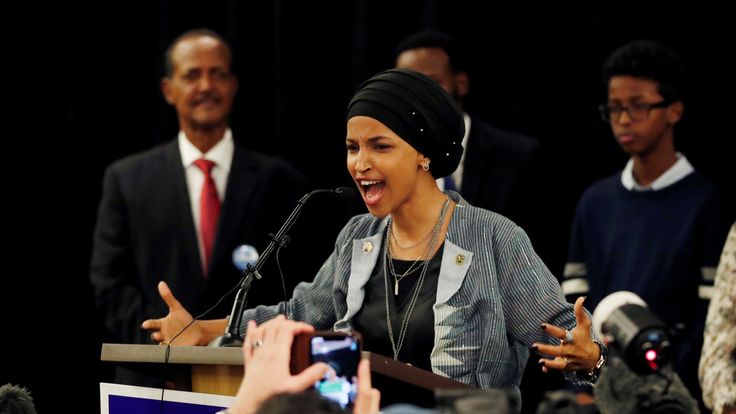Donald Trump says it was a "tremendous success" but as the dust settles on the US midterms what will it be remembered for?
Here, Sky News looks at the five key takeaways after mixed election results for the president.
People really cared
Americans got out and voted: the final figure is not yet confirmed but some estimates put it at 114 million.
That is far higher than 2014, which had the lowest turnout since the Second World War at 83 million, or just over 36%.
Female and young voters – keen to have their say in a vote widely perceived to be about the president himself – are thought to have played a big part in boosting the turnout.
Some 38.4 million Americans cast their vote early ahead of this election, compared with 27.4 million in the 2014, according to Michael McDonald of the US Elections Project.
Record number of women elected
At least 100 women are set to make up the House of Representatives, beating the previous record of 84.
Among those are Alexandria Ocasio-Cortez, the youngest woman ever elected to Congress at 29 years old.
Two Muslim women were also elected for the first time: One-time Somali refugee Ilhan Omar, of Minnesota, and Rashida Tlaib, of Michigan, who is the daughter of Palestinian immigrants.

Ayanna Pressley became Massachusetts' first black woman elected to Congress, while Democrats Veronica Escobar and Sylvia Garcia become the first Hispanic women to represent Texas.
The elections also tied the record for most governor seats held by women – nine – a number that was previously reached in 2004 and 2007.
And, in a night of firsts, Jared Polis became America's openly gay male governor, taking charge in Colorado.
Democrat stars fall short
Three of the party's most high profile candidates were beaten. In Texas, Beto O'Rourke was hoping to become the first Democrat senator there since 1988 and had pulled in tens of millions in campaign funding, as well as touring all 254 Texas counties.
But the 46-year-old was beaten by incumbent Ted Cruz by around 2.5 percentage points. He could be back though, with talk he may go for the presidential nomination in 2020.

In Florida, it was an extremely close call but Andrew Gillum, the man bidding to become the state's first black governor, lost to Republican Ron DeSantis by less than one point.
Stacey Abrams' bid to make it as the nation's first black female governor also looked over as she trailed in Georgia with nearly all the votes counted. Early on Wednesday, she was refusing to concede and is hoping for a run-off contest.
Pundits on point
There were no massive surprises or seismic shifts.
Experts called it right by predicting the Democrats would win control of the House of Representatives – vitally giving them power to launch inquiries into President Trump's affairs and issue subpoenas. They also correctly predicted the Republicans keeping control of Congress.
Republican losses were expected though, as the president's party traditionally suffers losses in the first midterm election.
Gridlock on the horizon
Mr Trump's plans will find it harder to get approved into law now the Democrats have a majority in the House.
Controversial plans such as the Mexico wall or ending birthright for children of illegal immigrants will likely be blocked.

The president struggled even when his party controlled the House, most notably when his plan to fully repeal Obamacare failed.
:: What does losing House mean for Trump's presidency?
He will be forced to modify and moderate more of his agenda now – forcing him to work with the Democrats and causing potentially long delays in Congress.
But, as he has threatened recently with the birthright issue, Mr Trump may resort to pushing some through using a stroke of his pen and signing an executive order.
[contf] [contfnew] 
Sky News
[contfnewc] [contfnewc]






